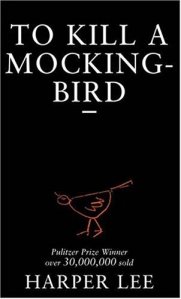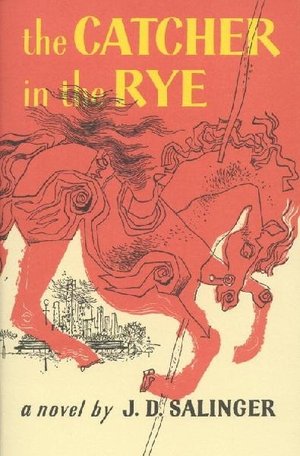I love it when the New York Times publishes articles on children’s literature.
No, really! I do!
Most of the time, these articles are somewhat… um… problematic. Booksellers, librarians, teachers, bloggers and other Children’s Literature People threw themselves into a tizzy when the NYT talked about the death of picturebooks. When the mainstream media gets a hold of OUR literature, the claws always come out: something is always misrepresented, there is always some commentary to be made.
But normal, non-Children’s Literature People step in the fray, as well. I just wrote a rousing really awful paper on Julie Just’s 2009 article, “The Problem with Parents in YA.” Again, the article was problematic in and of itself – I spent almost 2,000 words examining those intricate problems two weeks ago – but what I found fascinating was the COMMENTS section. In case you don’t feel like clicking links, I’ll share with you the top comment on this article
I’m an old, old, person. And I don’t read young adult novels. To me, little can be more boring than a story designed for a child. Love the sinner, hate the sin.
And that right there is why I love when the New York Times publishes articles on children’s literature, and why I love studying it and am glad I am in this program and not some random other English MA program:
There is something about children’s literature, specifically, that gets under everyone’s skin,
and inspires EVERYONE to share their unexamined comments, opinions, prejudices, and random opinions.
Even if their response to a thoughtful, albeit slightly misguided article is the ever-useful, unapologetic observation that
“those books are boring.”
That is just a fascinating impulse to me. Compare these articles and responses to, say, a random book review for a new “literary” adult title by any unnamed author, or perhaps an article talking about classic literature. Nobody feels a need to jump into the conversation – they leave the literary discussion to the experts. Everyone assumes that the author of said article knows more about that kind of literature than they do. If the NYT posts an article about War and Peace, most people haven’t read it, or read it under duress, and aren’t interested enough to speak up. There’s also an unspoken understanding that just because you’ve READ War and Peace does not make you an expert on Russian Literature. You haven’t read War and Peace enough, read it in the right way, read enough other Russian Literature to speak about it.
There is something about children’s literature that makes EVERYONE feel like they are an expert.
This has various implications for the legitimacy or the perception of the study of children’s literature, but I love it. I love it! It is so INTERESTING to see these conversations going on in a public forum, and it’s a helluva nerdy-good-time watching everyone reveal themselves when they open their mouths.
The flavor of the NYT week is Lisa Belkin’s review of two new young adult novels about teen dating abuse.
Ms. Belkin opens her article with this little doozy:
“The purpose of young adult literature is often twofold: to tell a story, and to send a message, usually in the form of a much-needed lesson.”
Which, even reading it for the third or fourth time now incites the same reaction in me:
“Oh…… honey……”
There is so much going on, even in that first line, that is just ASKING for the Children’s Literature People to rally their forces. I really like Ms. Belkin’s Parenting Blog – I think it’s smart and relevant. But this goes to show – there is something about children’s literature that makes even smart, relevant people make unexamined, unsupported statements IN THE OPENING LINES OF AN ESSAY.
Can you imagine an article talking about Jonathan Franzen or Jennifer Egan’s new works opening with “The purpose of adult literature is often twofold: to tell a story, and to send a message?”
First of all, nobody ASSUMES that adult literature needs to HAVE a purpose, eh?
And, NOBODY would assume that even if there was a purpose, it would be to “send a message,” unless it’s some kind of religious or political propaganda, right?
Assumptions.
The article rolls out, assumption after assumption after assumption. In the first three paragraphs alone, Ms. Belkin seems to believe that:
- Parents’ perceptions of the contents of a young adult novel are important to the discussion of the genre. (Parents appear in the article immediately after that zinger of a first line)
- Teen books don’t appeal to adults. (Although she has at least that Julie Just commenter on her side…)
- Teens like young adult fiction because it doesn’t appeal to adults.
- Good young adult books do MORE than tell a story and send a message, but it is implied that they must ALSO do both of those things.
- Bad young adult books feel like “after-school” specials.
- “Where ‘Bitter End’ and ‘Stay’ fall short is more a reflection of the pitfalls of the genre than the talents of their authors,” seems to imply that even great, talented authors would have trouble writing a TRULY great young adult novel because the genre REQUIRES that AWFUL message to be there.
Correct me if I’m off base, but I think Ms. Belkin’s central thesis is that YA lit requires both STORY and MESSAGE, but that somehow, these two novels she examines (Stay by Deb Caletti and Bitter End by Jennifer Brown) fail to do either well because the story gets in the way of a clear message and the message gets in the way of good characters and plot.
Two of the more popular responses to this article are from other young adult authors – Sarah Ockler and Bennett Madison – although I’m sure other Children’s Literature People will get their own 2 cents in soon enough.
Ockler and Madison’s beef is the assumption that young adult literature must have a MESSAGE.
Literature should be literature. Stories just stories. Nobody should try to impose a moral meaning on a text, nobody should expect there to be one, nobody should examine a book in terms of its “message” or judge a book on the quality of said message.
But I find even THAT to be another ASSUMPTION.
Perhaps slightly more examined than Belkin’s rampant assumptions (oh, that first line… you were just ASKING for it, Lisa!), but still an assumption.
I counter your arguments, Belkin, and your counter-arguments, Ockler and Madison with this genius piece by the one-and-only M. T. Anderson…
who surely needs his assumptions to be examined as well.
The central thesis of this post?
This is a never ending cycle and it will never cease to engage me.
There is something about children’s literature that gets everyone involved.
And I’d like to figure out what that something is.


















































